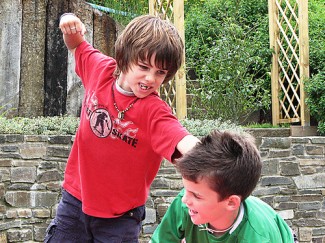Cove (Music Journal)
LQ: 8.8
Recommended Age: 8+
Skills Used: Organization, Self-Awareness
 Disruptive Behavioral Conduct, Oppositional Defiant Disorders, and behavior problems are defined by disobedient, aggressive, or rule-violating behavior. By definition, Behavioral Problems cause difficulties in one or more areas of the child’s life including at home with family members, in school, or in the community. The problems are generally reported by authority figures and not by the children themselves.
Disruptive Behavioral Conduct, Oppositional Defiant Disorders, and behavior problems are defined by disobedient, aggressive, or rule-violating behavior. By definition, Behavioral Problems cause difficulties in one or more areas of the child’s life including at home with family members, in school, or in the community. The problems are generally reported by authority figures and not by the children themselves.
Many children who do not have a diagnosable Disruptive Behavioral Disorder still experience mild difficulties with following rules, listening to adults, or engaging in overly aggressive behavior with their peers. These Alternative Learners may not need the same level of intervention that a child with a Disruptive Behavioral Disorder might, but he can still be helped by many of the technological and academic strategies presented here.
Parents of children with Behavioral Problems often find that video games and other digital media offer several ways of helping their child cope with their symptoms and negative emotions. Specifically, kids with Behavioral Problems tend to display less of the characteristic symptoms of frustration or negativity when involved with digital technologies. The following chart demonstrates some of the ways that video games and other digital media can be helpful for these children.
| Kids with Behavioral problems: | Video Games and Digital Media |
| Often respond best to clear, immediate consequences or reinforcement. | Many video games provide clear and immediate feedback for right and wrong directions. |
| Often are described as seeking stimulation in their environment. | Video games and digital media use highly stimulating multi-media including, video, sounds, words, and actions. |
| May not like following directions from authority figures. | There is typically not an adult telling the child how to play, and kids learn directly from their experiences in the game. |
| May frequently test limits. | Testing the limits in a video game provides direct and immediate feedback about the success or failure of this action. |
| May have a higher incidence of failures and difficulties in traditional schools. | Video games allow you to learn at your own pace, so that even if something is difficult, you can try it again privately without embarrassment due to failure. |
 Self-control: Kids with these difficulties have problems with thinking before acting and can be impulsive.
Self-control: Kids with these difficulties have problems with thinking before acting and can be impulsive. Due to the fact that many children with behavioral difficulties are looking for sensation-seeking action, the stimulation of video games can easily engage them. Through this engagement, these children can become more attentive and focused on what they are doing and learning.
Due to the fact that many children with behavioral difficulties are looking for sensation-seeking action, the stimulation of video games can easily engage them. Through this engagement, these children can become more attentive and focused on what they are doing and learning.
It is not only action, adventure, or shooter games that can engage children with behavior problems. Even a fast-paced educational or historically-based game is likely to engage their effort. In addition, using digital tools such as video cameras, digital cameras, and game-making programs such as Gamestar Mechanic or Scratch, tend to engage these children in a manner dissimilar to that of traditional educational approaches.
For example:
 While the capacity of video games and other digital media to engage children with Disruptive Behavioral Disorders and behavior problems is great, these children can also experience significant difficulties as a result of too much or inappropriate video game play.
While the capacity of video games and other digital media to engage children with Disruptive Behavioral Disorders and behavior problems is great, these children can also experience significant difficulties as a result of too much or inappropriate video game play.
As a result, we encourage parents to be very judicious about and monitor the use of digital media for children with behavioral problems. Consult the table below to see what you should watch out for, and how you can go about avoiding these problems.
| Cautions | Solutions |
| A particular concern for these children is over-exposure to violent and aggressive video games. | Try to strictly enforce ESRB and recommended age limits for children’s use of video games. Do not allow a 10-year-old with serious behavior problems to play “M-rated” games. |
| Because video games are so engaging, they can often become a source of arguments and issues of control and power in a household. | A way to be in control of this rather than to have a fight every time, is to have a parent be the owner of the consoles and to maintain straightforward rules about which games the child plays and when he is allowed to play them. |
| Children with Behavior Problems may be more apt to go to inappropriate websites and engage in cyber-bullying and other aggressive behaviors online. | Make sure that video game and other digital media use is done in a public area. Also, try to check in on your child every so often while he is engaged in digital play. Start-up a conversation when you see that he has reached a pause in the game, or right after he is finished. |
 Treating Disruptive Behavioral disorders and behavior problems often requires a multi-faceted set of strategies. Working with family therapists to learn how to set effective limits can be helpful. Attempting to address these underlying concerns becomes important.
Treating Disruptive Behavioral disorders and behavior problems often requires a multi-faceted set of strategies. Working with family therapists to learn how to set effective limits can be helpful. Attempting to address these underlying concerns becomes important.
Common interventions for children with Disruptive Behavioral Disorders and behavior problems include behavioral, educational, and medical approaches. These include:
Extreme sports such as skateboarding, surfing, rock climbing, and snowboarding can improve executive functions as well as social and emotional learning. Kids may be pulled to these sports due to […]
Homeschooling has become increasingly popular in the United States. Current estimates suggest that nearly 1,800,000 students are being homeschooled, approximately 3.4% of the school-age population. Parents choose to homeschool their […]
One of the more frequent themes I hear in my practice with children with ADHD, autism, Executive Functioning Disorder, and anxiety is how easily they report being bored. This becomes […]
All membership plans come with full access to our entire suite of tools learning guides, and resources. Here are a few of the ones we think you’ll like the most: